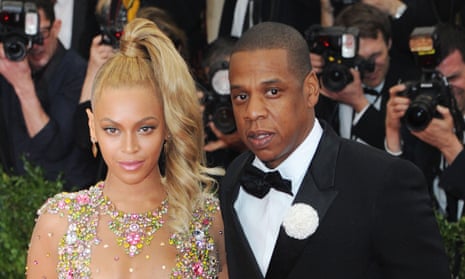It was on a 2005 Kanye West remix of Diamonds From Sierra Leone that Jay Z spat the defining lyric of his past decade: “I’m not a businessman, I’m a business, man / So let me handle my business, damn.” Today he ranks second only to Dr Dre as the nation’s biggest hip-hop impresario.
The way he has built and leveraged his personal brand has been crucial to his success: along with his entertainment company Roc Nation (Rihanna, Calvin Harris, J Cole), Jay Z’s portfolio now includes real estate (small stakes in the Barclays Center), nightlife (high-end sports bar 40/40 Club) and film production (The Great Gatsby, Annie).
Plus, every new article dissecting his corporate smarts presents yet another opportunity for Jay Z to retell his story of how he sold kilos of drugs to survive while growing up in Brooklyn’s Marcy projects. That way, no matter how big his portfolio gets or how many Basquiats he buys, his fans still feel invested in his success.
Jay Z did not bring up the Marcy projects when he introduced his recently acquired music streaming service, Tidal – but he should have. Instead, during his splashy press conference in Manhattan, he had Alicia Keys step up to the podium and speak about Tidal’s unveiling as if it were a graduation.
Presumably, Keys was addressing the A-team of famous friends-turned-part owners, who signed a “declaration” that appeared to be blank. “We have joined in Tidal for the preservation of an industry,” she said. Six weeks on, the app has dropped out of the iTunes top 700, the CEO has been replaced and everyone from venture capitalists to Mumford and Sons have been queueing up to pronounce Tidal a grand folly. Last week, Jay Z announced that he would perform a concert of his B-sides in New York this month exclusively for Tidal members, but that seems unlikely in itself to turn the tide.
Tidal’s unveiling isn’t the first time that Jay Z has slipped up as a businessman. When he was president of Def Jam from 2004 to 2007, he neglected the releases of flagship artist LL Cool J to prep his own un-retirement album, 2006’s anticlimatic and confused Kingdom Come. Seven years later, in a commercial that premiered during the NBA finals, Jay Z urged his team of superstar producers, including Rick Rubin, to “write the new rules” with his subsequent record Magna Carta … Holy Grail.
In a 2008 issue of Vibe, Elliott Wilson lists several examples of how Jay Z has abused his power since he emerged with the cautionary tales of his 1996 debut Reasonable Doubt. “Stan Un (Google It). Fuck Nas’ baby mama. Abandon R Kelly when the drama comes. Dump Dame. Shelve Joe Budden. Drop DMX.” Because Jay Z had just released the inspired American Gangster, though, all was forgiven. “We still love him.”
Unfortunately, the mailed-in Magna Carta … Holy Grail showed that any spirit of innovation no longer lay in the music, but its means of distribution – Samsung paid for a million digital copies to give away to Galaxy owners. (This was a bigger victory for Hov than consumers, due to technical issues and the app’s invasive permission settings.) A month later, MIA threatened to leak her fourth album Matangi after Interscope put the project on hold. At the end of 2013, she left her management deal with Roc Nation.
“I don’t think anyone even cares about how good his records are,” a “prominent” rock-band manager told New York magazine in 2013. To be fair, Jay Z has the numbers to back him up: even Kingdom Come had first-week sales of 680,000 copies, though it was predicted to move 800,000-plus.
But these minor, music-related setbacks hint at the larger reason behind the recent, swift backlash against Tidal. Jay Z’s best records have a sense of occasion, like 2001’s The Blueprint, when he seemed to occupy New York’s hip-hop throne; or 2003’s The Black Album, the closing-credits record that (prematurely) announced his rap game retirement. (For this he teamed with Nokia, though in retrospect that barely matters.)
Tidal’s whole sales pitch was predicated on supporting artists like Jay Z, but utterly failed to make its case. As Death Cab for Cutie’s Ben Gibbard said, that press conference could have shown how those premium fees could boost struggling artists. Another option, however, would have been for Jay Z to imagine how he would have escaped the Marcy projects had he tried to make his debut today.

Comments (…)
Sign in or create your Guardian account to join the discussion